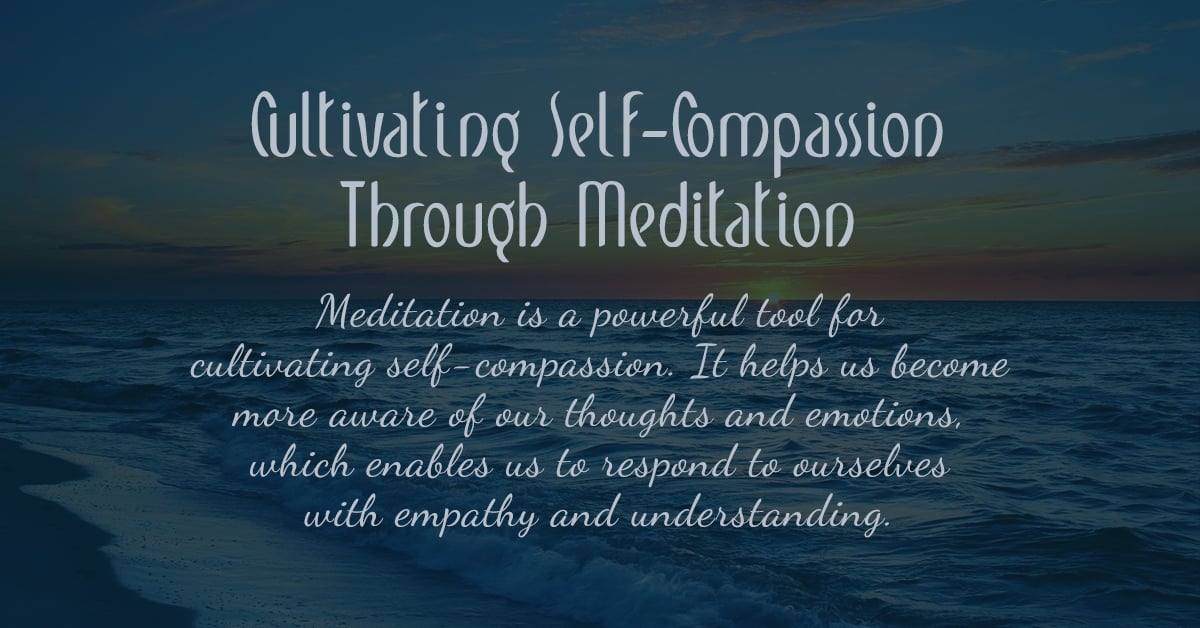
A Guide to Transforming Your Relationship with Yourself
In our fast-paced world, it’s easy to get caught up in the busyness of life and forget to show ourselves some kindness. We may beat ourselves up for not meeting our expectations or compare ourselves to others. However, self-compassion is critical for personal growth and well-being. When we learn to treat ourselves with the same kindness and understanding we would offer to a close friend, we become more resilient, happier, and more confident.
Meditation is a powerful tool for cultivating self-compassion. It helps us become more aware of our thoughts and emotions, which enables us to respond to ourselves with empathy and understanding. Moreover, meditation teaches us to be present in the moment and non-judgmental, which can help us let go of self-criticism and self-doubt. In this article, we’ll explore the benefits of meditation for self-compassion and offer some practical tips for incorporating it into your daily practice.
The Benefits of Meditation for Cultivating Self-Compassion
Meditation has been shown to have numerous benefits for our physical and mental health, including reducing stress, anxiety, and depression. But how can meditation help us cultivate self-compassion? By practicing mindfulness meditation, we learn to observe our thoughts and emotions without judgment. This allows us to become more aware of the negative self-talk we engage in and to recognize when we are being self-critical or harsh.
Moreover, meditation helps us develop a more compassionate attitude towards ourselves. By becoming more aware of our thoughts and emotions, we learn to respond to ourselves with kindness and understanding. We can also use meditation to visualize ourselves as a loving friend or mentor, offering ourselves words of support and encouragement. This practice can help us develop a more positive self-image and increase our sense of self-worth.
Practical Tips for Incorporating Meditation into Your Self-Compassion Practice
If you’re new to meditation, it can be challenging to know where to begin. However, incorporating mindfulness meditation into your self-compassion practice is relatively simple. Here are some practical tips to get you started:
- Find a quiet, comfortable place where you won’t be disturbed. Sit comfortably on a cushion or chair with your back straight and your hands resting on your lap.
- Focus on your breath. Take a few deep breaths and then allow your breath to settle into its natural rhythm. Notice the sensation of your breath as it moves in and out of your body.
- Bring your attention to your thoughts and emotions. Notice any thoughts or emotions that arise and observe them without judgment. If you find yourself being self-critical, acknowledge the thought and then let it go, returning your focus to your breath.
- Visualize yourself as a loving friend. Imagine yourself in a peaceful, supportive environment, surrounded by people who care about you. Visualize yourself as a loving friend or mentor, offering yourself words of encouragement and support.
By practicing mindfulness meditation regularly, you can develop greater self-awareness, compassion, and self-acceptance. Remember, self-compassion is a skill that takes time and practice to develop. Be patient with yourself, and don’t expect to get it right the first time. With time and dedication, you can transform your relationship with yourself and live a happier, more fulfilling life.
Cultivating self-compassion through meditation is a powerful way to transform your relationship with yourself. By practicing mindfulness, we become more aware of our thoughts and emotions, allowing us to respond to ourselves with empathy and understanding. Moreover, visualization techniques can help us develop a more positive self-image and increase our sense of self-worth.
[/et_pb_text][/et_pb_column][/et_pb_row][/et_pb_section]By incorporating meditation into your self-compassion practice, you can develop greater self-awareness, compassion, and self-acceptance.
Adam Bernard is a digital entrepreneur and the founder of several successful ventures, including Lynx Digital Marketing and the AI strategy platform gibLink.ai. With deep experience navigating every major shift on the digital frontier, his work today is focused on his “Human + AI Co-Creation” model, a framework for making artificial intelligence accessible and actionable for businesses of all sizes.
Adam’s unique “balance-brained” approach blends creative problem-solving with technical execution, helping clients and students transform complex challenges into tangible opportunities for growth.
Mastering the Art of Relaxed Response Meditation is an enlightening journey, a tranquil odyssey into the realm of quietude. This transformative practice taps into inner peace, fostering a serene response to life's upheavals. Embrace this soulful, liberating art, and transcend the cacophony of life's chaos, one breath at a time.
In our fast-paced world, stress and distraction have become daily adversaries. Discover the transformative power of meditation, an ancient practice now backed by modern science. Learn techniques that not only alleviate stress but also enhance focus, opening the door to a more serene and productive life.
In a world filled with noise and chaos, finding self-kindness can feel elusive. However, through meditation, we can cultivate this vital quality, creating a sanctuary within ourselves. This article explores the transformative power of meditation in fostering self-kindness, offering a pathway to inner peace and compassionate self-awareness.
Discover the transformative power of self-compassion in six simple steps. Learn to silence self-criticism, cultivate kindness towards yourself, and unlock a new level of emotional wellbeing. Turn life's challenges into stepping stones as you foster resilience, positivity, and self-love. It's time for a kinder inner dialogue.






